一单元总复习六年级英语下册
深圳小学英语六年级下册unit1-unit3复习

六年级英语复习unit1-unit3第一单元知识点短语1.meet new people遇见生人2.answer the phone接电话3.walk on busy streets走在繁忙的大街上4.wait for a bus等公交车5.shake hands 握手6.talk to sb 与…交谈7.hug people拥抱 8.say“hello”说“您好” 9.takea message记录留言10.say“Excuse me“说“抱歉”11.line up排队12.Don’t push 不要推挤13.the first time第一次 14.arrive in/at到达 15.write down记下,写下16.see you tomorrow明天见 17.have a fever发烧 18.havea test举行考试19.find out找出,发现 20.lose a game输掉一场比赛 21.makea mistake犯错22.make a deal成交 23.worry about…着急,担心…句型1.How should I……?/how should I answer the phone?我应该怎样….?我应该怎样接电话?2.What should I do when I meet new people?我见到生人应该做什么?3.when you meet older people , you should shake hands with them.当你见到年长的人,你应该和他们握手。
第2单元知识点短语1..hear the fire alarm听到火警2.get up quickly迅速起床3.leave the room离开房间4.take your things拿你的东西5.take the lift乘电梯6.walk down the stairs quickly快速走下楼梯7.get out of the building走出大楼8.call 119 打1199..put out the fire灭火10.what happened?发生了什么事? 11..the fire alarm火警 12.look out of the window看窗外13.see smoke 看到烟14.play with …和…玩15.you are right你说的对16.in the kitchen在厨房 17.a long time ago很久以前 18.from 7am to 7pm从早七点到晚七点19.thank sb for sth因…感谢某人20.be careful小心21.turn on /off打开/关掉22.fire drill消防演习 23.at first最初句型1. When I looked out of the window ,I saw smoke.当我往窗外望时,我看到了烟。
新人教pep版六年级英语下册unit1复习总结

新人教pep版六年级英语下册unit1复习总结一、单词巩固:(写出下列形容词的比较级)一、重点句子。
1.I’m taller than this dinosaur.我比这只恐龙高。
2.Some dinosaurs are bigger than houses.Some are smaller than our schoolbags.一些恐龙比房子大。
一些比我们的书包小。
3.询问体重的问句:--How heavy is it?它体重多少?--It’s five tons.它5吨。
4.询问鞋子的尺码:--What size are your shoes?你穿多大号的鞋?--What are your shoes?你穿多大号鞋?--My shoes are size35.我穿35号的鞋。
5.询问高度:--How tall is it?它有多高?--Maybe4metres.可能4米。
--I’m1.65metres.我身高1.65米。
--Size7.7号。
6.询问体重:--How heavy are you?你体重多少?--I’m48kilograms.我体重48千克。
课堂操练:按要求完成句子。
1.I am46kilograms.(对画线部分提问)1.Ⅰwear size37in China.(对画线部分提问)2.My friend is9years old.(对画线部分提问)3.Peter is shorter than Sam.(对画线部分提问)5.I am stronger than my brother.(改为一般疑问句)三、语法专项:形容词比较级的规则变化:单音节词和少数双音节词:(1)一般在词尾加“er”。
例如:tall—taller,young younger,old一older,small smaller。
(2)以字母“e”结尾的词,加“r”。
例如:fine—finer,nice-nicer,late-later。
六年级下册英语第一单元Unit1知识点总结

Unit1知识点总结01反义词或对应词heavy –light before –after easy –difficultsame –different early—late forget-rememberask---answer high---low teach—learn open-close02不规则动词过去式buy---bought think—thought bring—broughtteach---taught swim-swam go-went hit-hit find-found03现在分词hit-hitting sit-sitting run-running swim-swimming get-getting came- caming make-making dance-dancing write-writing注意:am/is /are+doing 表示正在做doing 问ing答4.will 或be going to +动词原形表示将来0104句子1. Ping-pong is my favourite sport. 乒乓球是我最喜欢的运动。
2.Of all sports, I like basketball best. 所有运动当中我最喜欢篮球。
3. Can you teach me to play basketball?你能教我打乒乓球吗?teach +谁(宾格)to +do4. I can learn to play basketball.我能学打篮球。
learn+to+doAre you ready to learn basketball? 你准备好学打乒乓球了吗?I can learn English. learn +物品I can learnthe song.5.Do you have any ping-pang balls?你有乒乓球吗?Do you have any T-shits?你有T恤吗?any 通常用在否定句和疑问句中。
人教PEP版英语六年级下册Unit 1-4知识点总结(期末复习)
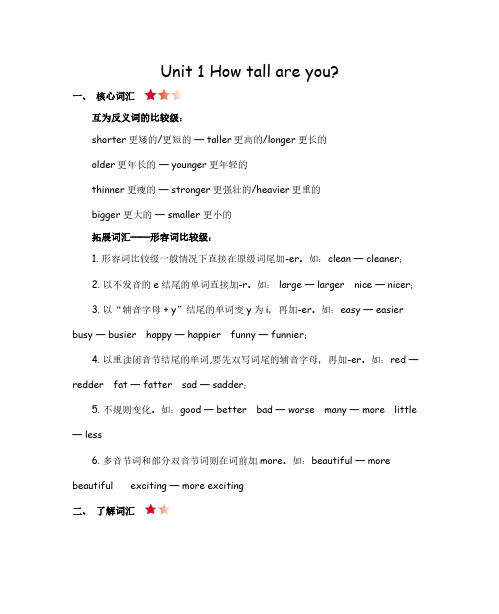
Unit1How tall are you?一、核心词汇互为反义词的比较级:shorter更矮的/更短的—taller更高的/longer更长的older更年长的—younger更年轻的thinner更瘦的—stronger更强壮的/heavier更重的bigger更大的—smaller更小的拓展词汇——形容词比较级:1.形容词比较级一般情况下直接在原级词尾加-er。
如:clean—cleaner;2.以不发音的e结尾的单词直接加-r。
如:large—larger nice—nicer;3.以“辅音字母+y”结尾的单词变y为i,再加-er。
如:easy—easier busy—busier happy—happier funny—funnier;4.以重读闭音节结尾的单词,要先双写词尾的辅音字母,再加-er。
如:red—redder fat—fatter sad—sadder;5.不规则变化。
如:good—better bad—worse many—more little —less6.多音节词和部分双音节词则在词前加more。
如:beautiful—more beautiful exciting—more exciting二、了解词汇dinosaur恐龙hall大厅metre米(美式英语:meter)than比both两个都kilogram千克;公斤countryside乡村lower(low的比较级)更低地shadow阴影;影子smarter(smart的比较级)更聪明的become开始变得;变成三、核心句型1.—How tall are you?你有多高?—I’m1.64metres.我身高1.64米。
2.—What size are your shoes,Mike?迈克,你穿多大号的鞋?—Size7.7号。
3.—How heavy are you?你体重多少?—I’m48kilograms.我体重48公斤。
六年级英语下册总复习资料

六年级英语下册总复习资料Unit 1: My School Life- Vocabulary: school subjects, activities, school objects- Grammar: present simple tense, interrogative sentences with "do" and "does"- Writing task: writing about daily school routineUnit 2: Our Planet Earth- Vocabulary: geography terms, natural disasters, environmental issues- Grammar: present continuous tense, affirmative and negative sentences, question forms- Writing task: writing a short paragraph about how to protect the environmentUnit 3: Let's Have Fun!- Vocabulary: sports and leisure activities, hobbies- Grammar: past simple tense, regular and irregular verbs- Writing task: writing about a favorite hobby or sportUnit 4: Exploring Nature- Vocabulary: plants, animals, habitats- Grammar: present perfect tense, affirmative and negative sentences, question forms- Writing task: writing about a memorable nature experience- Grammar: future tense, "going to" for future plans- Writing task: writing about a future dream jobUnit 7: Health and Fitness- Vocabulary: body parts, healthy habits, sports and exercises- Grammar: imperative sentences, giving advice- Writing task: writing a short paragraph about staying healthy and fitUnit 8: Celebrations Around the World- Vocabulary: traditions, holidays, cultural events- Grammar: past continuous tense, affirmative and negative sentences, question forms- Writing task: writing about a favorite celebration and its significance标注符号解释:- Vocabulary: 词汇- Grammar: 语法- Writing task: 写作任务以上是六年级英语下册总复习资料,包括每个单元的重点内容。
六年级下册英语一单元知识点归纳

六年级下册英语第一单元的知识点归纳如下:
1.词汇:本单元主要学习一般过去时态,涉及的词汇包括动词的过
去式、过去分词以及一些形容词和副词的比较级和最高级形式。
例如:
●动词过去式:studied, visited, shopped, played
●动词过去分词:visited, shopped, played
●形容词比较级:bigger, better, worse, worse
●形容词最高级:biggest, best, worst
2..语法:本单元主要学习一般过去时态的用法,包括过去式动词的
构成规则和用法、过去分词的构成规则和用法、过去式的否定形式以及一般疑问句的构成和回答方式等。
3. 2.阅读理解:本单元的阅读材料主要是以一般过去时态为主的故
事或文章,学生需要理解并回答与文章内容相关的问题,提高自己的阅读理解能力。
4. 3.写作练习:本单元的写作练习主要是要求学生运用一般过去时
态来描述自己或他人的过去经历或事件,提高自己的写作能力和表达能力。
5. 4.口语练习:本单元的口语练习主要是要求学生能够运用一般过
去时态进行简单的对话和交流,提高自己的口语表达能力。
6. 5.文化知识:本单元还涉及一些西方文化知识,例如西方国家的
节日、习俗、礼仪等,学生需要了解并掌握这些文化知识,以便更好地理解和运用英语语言。
以上是六年级下册英语第一单元的主要知识点,学生需要认真学习和掌握这些知识点,以便更好地理解和运用英语语言。
人教版PEP六年级英语下册Units 1~2 综合复习 附答案

人教版PEP六年级英语下册Units 1~2 综合复习时间:60分钟满分:100分听力部分(40分)一、听录音,选出你所听到的单词。
听两遍。
(10分)( )1. A. metre B. kilogram C. dinosaur( )2. A. smarter B. stronger C. smaller( )3. A. better B. faster C. thinner( )4. A. cleaned B. clothes C. countryside( )5. A. broken B. enjoy C. hotel二、听录音,选出与你所听内容相符的图片。
听两遍。
(10分)( )1.( )2.( )3.( )4.( )5.三、听录音,选出正确的答语。
听两遍。
(10分)( )1. A. I’m 1.48 metres. B. I’m 48 kilograms.C. I’m 14 years old.( )2. A. Yes, I did. B. No, I don’t. C. Yes, I can. ( )3. A. It is OK. B. It was good. C. They were interesting! ( )4. A. I wear size 35 shoes. B. Tom’s feet are bigger than mine.C. Tom is older than me.( )5. A. He did his homework. B. I cleaned my room.C. She washed her clothes.四、听录音,选出正确的答案。
听两遍。
(10分)( )1. I ________ last Sunday.A. went to the parkB. saw a filmC. went to the zoo ( )2. The ________were very cute. My sister liked them very much.A. monkeysB. elephantsC. pandas ( )3. The elephants were ________ than the giraffes.A. tallerB. shorterC. thinner ( )4. ________ took many pictures of the animals.A. IB. My fatherC. My sister ( )5. We went home at ________ o’clock.A. threeB. fourC. five笔试部分(60分)五、选出下列每组单词中不同类的一项。
(完整版)六年级下册英语知识点总结

(完整版)六年级下册英语知识点总结六年级下册英语知识点总结第一单元(Unit1 How tall are you?)单词:tall—taller更高的short—shorter 更矮的strong—strong更强壮的old—older年龄更大的young—younger 更年轻的big—bigger更大的heavy—heavier 更重的long—longer 更长的thin—thinne更瘦的small—smaller 更小的dinosaur恐龙hall大厅metre,meter 米than比both 两个都kilogram千克,公斤countryside乡村low—lower更低的shadow阴影,影子smart—smarter更聪明的become开始变得,变成句子:1、That's the tallest dinosaur in this hall.那是这个厅里最高的恐龙。
2、You’re older than me. 你比我大。
3、How tall are you ?你有多高?I’m 1.65 metres.我身高1.65米。
4、What size are your shoes ?你穿多大号的鞋?5、My shoes are size 37. 我穿37号的鞋。
6 、Your feet are bigger than mine .你的脚比我的大。
7、How heavy are you ?你有多重?I’m 48 kilograms .我体重48公斤。
8、It’s taller than both of us togethe r .它比我们俩加在一起还高。
应该掌握的知识点:1、形容词变为比较级的变化规则:(1)一般情况下,在形容词的词尾直接加er。
如: tall—taller short—shorter.(2)以字母e结尾的形容词,在词尾直接加r,如:nice—nicer. late—later(3)以重读闭音节结尾,且结尾只有一个辅音字母的词,先双写这个辅音字母,再加er.如:big—bigger thin—thinner fat—fatter(4)以辅音字母加y结尾的双音节形容词,先变y为i , 再加er。
苏教版六年级英语下册第一单元知识点
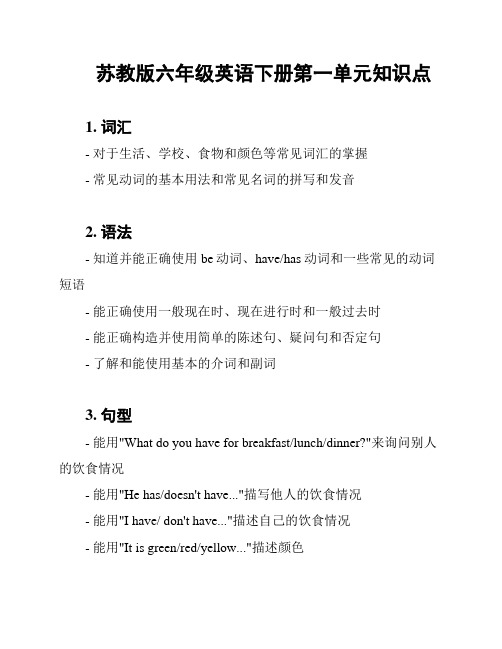
苏教版六年级英语下册第一单元知识点
1. 词汇
- 对于生活、学校、食物和颜色等常见词汇的掌握
- 常见动词的基本用法和常见名词的拼写和发音
2. 语法
- 知道并能正确使用be动词、have/has动词和一些常见的动词短语
- 能正确使用一般现在时、现在进行时和一般过去时
- 能正确构造并使用简单的陈述句、疑问句和否定句
- 了解和能使用基本的介词和副词
3. 句型
- 能用"What do you have for breakfast/lunch/dinner?"来询问别人的饮食情况
- 能用"He has/doesn't have..."描写他人的饮食情况
- 能用"I have/ don't have..."描述自己的饮食情况
- 能用"It is green/red/yellow..."描述颜色
4. 对话和交流
- 能进行简单的自我介绍,并描述自己的饮食偏好和颜色喜好- 能与他人讨论和比较饮食和颜色喜好
- 能用日常用语和同学进行简单的交流和问候
5. 听力能力
- 能听懂简单的日常用语和问题
- 能听懂和理解简短的对话和句子
- 能正确应答关于饮食和颜色的基本问题
以上是苏教版六年级英语下册第一单元的知识点总结,希望对你有所帮助。
六年级下册英语Unit1知识点

六年级下册英语Unit1知识点1. 词汇本单元的重点词汇如下:1.animal - n. 动物2.plant - n. 植物nd - n. 陆地4.sea - n. 海洋5.forest - n. 森林6.jungle - n. 丛林7.desert - n. 沙漠8.mountain - n. 山9.river - n. 河流ke - n. 湖泊11.ocean - n. 大洋12.continent - n. 大陆 - n. 亚洲14.Africa - n. 非洲15.Europe - n. 欧洲16.Antarctica - n. 南极洲17.Australia - n. 澳洲18.North America - n. 北美洲19.South America - n. 南美洲2. 语法本单元主要学习以下语法知识:2.1 一般现在时一般现在时表示经常性、习惯性或普遍性的动作或状态。
其结构为:主语 + 动词原形。
例如:•I like to play basketball.•She eats breakfast every day.•They go to school by bus.2.2 四会动词四会动词是指学生在听、说、读、写中能正确使用和理解的常用动词。
在本单元中,我们学习了以下四会动词:•like - v. 喜欢•love - v. 爱•eat - v. 吃•go - v. 去我们可以将这些动词与一般现在时的语法结构结合使用,来描述日常生活中的动作和状态。
3. 句型本单元主要学习以下句型:3.1 主语 + like(s) to + 动词原形这种句型表示主语喜欢做某事。
例如:•I like to play soccer.•She likes to sing.3.2 主语 + 动词原形 + (s/es)这种句型表示主语经常或习惯性地做某事。
例如:•We eat lunch at 12:00.•The birds fly in the sky.4. 阅读理解在本单元的阅读理解部分,我们将通过阅读短文并回答问题来提高学生的阅读能力和理解能力。
六年级下册英语一二单元知识点
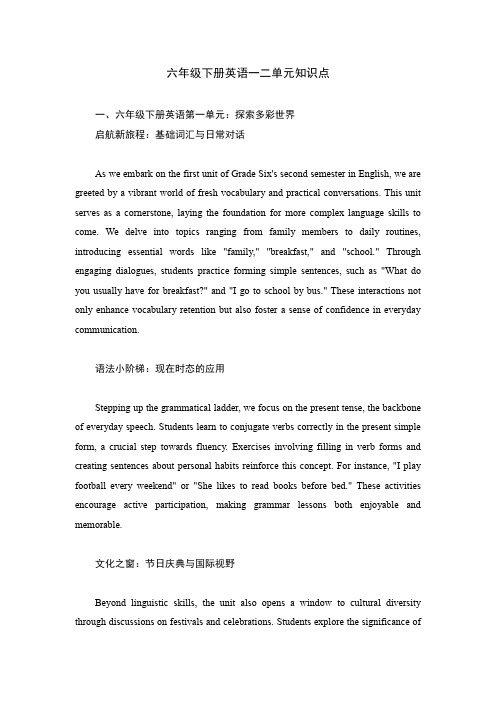
六年级下册英语一二单元知识点一、六年级下册英语第一单元:探索多彩世界启航新旅程:基础词汇与日常对话As we embark on the first unit of Grade Six's second semester in English, we are greeted by a vibrant world of fresh vocabulary and practical conversations. This unit serves as a cornerstone, laying the foundation for more complex language skills to come. We delve into topics ranging from family members to daily routines, introducing essential words like "family," "breakfast," and "school." Through engaging dialogues, students practice forming simple sentences, such as "What do you usually have for breakfast?" and "I go to school by bus." These interactions not only enhance vocabulary retention but also foster a sense of confidence in everyday communication.语法小阶梯:现在时态的应用Stepping up the grammatical ladder, we focus on the present tense, the backbone of everyday speech. Students learn to conjugate verbs correctly in the present simple form, a crucial step towards fluency. Exercises involving filling in verb forms and creating sentences about personal habits reinforce this concept. For instance, "I play football every weekend" or "She likes to read books before bed." These activities encourage active participation, making grammar lessons both enjoyable and memorable.文化之窗:节日庆典与国际视野Beyond linguistic skills, the unit also opens a window to cultural diversity through discussions on festivals and celebrations. Students explore the significance ofdifferent holidays, like Christmas and the Spring Festival, comparing traditions across countries. Through videos, readings, and group discussions, they develop an appreciation for cultural heritage while enhancing their cross-cultural communication skills. This interdisciplinary approach enriches their learning experience, making English language learning a truly global endeavor.实践乐园:角色扮演与创意表达To consolidate learning, students engage in role-play activities, simulating real-life scenarios. Whether it's ordering food at a restaurant or planning a family outing, these exercises allow for creative expression while reinforcing language structures. By stepping into different roles, students become more comfortable using the language in context, fostering a deeper understanding of how English is used in everyday life.二、六年级下册英语第二单元:自然奇观与环境保护走进自然奇观:词汇拓展与视觉盛宴Shifting gears, the second unit takes us on a journey through nature's wonders, introducing a wealth of vocabulary related to landscapes, wildlife, and weather. From "mountains" and "oceans" to "rainforest" and "polar bears," students are immersed in a visual feast of natural beauty. Through multimedia resources, they explore the unique features of each wonder, igniting curiosity and awe for the natural world.环保小卫士:环保理念与行动倡议With an eye towards sustainability, this unit emphasizes the importance of environmental protection. Students learn about the consequences of pollution, deforestation, and climate change, fostering a sense of responsibility towards the planet. Through discussions, debates, and writing assignments, they brainstorm waysto reduce their carbon footprint, such as recycling, conserving energy, and supporting eco-friendly initiatives. This process encourages critical thinking and empowers students to become active participants in environmental conservation.语言技能提升:描述与比较To enhance language proficiency, students practice describing natural wonders using adjectives and adverbial phrases. They learn to compare and contrast different landscapes, utilizing comparative and superlative forms of adjectives. For example, "The Grand Canyon is more impressive than the Niagara Falls because of its sheer size and depth." These exercises refine their descriptive skills, making their narratives more vivid and engaging.创意写作:我的环保梦想Wrapping up the unit, students are invited to unleash their creativity through writing. They are encouraged to pen essays or short stories about their vision for a greener future, outlining personal actions and larger-scale solutions to environmental challenges. This exercise fosters imagination and encourages students to think critically about their role in preserving the planet, ultimately inspiring a lifelong commitment to environmental stewardship.总结:通过对六年级下册英语第一二单元知识点的深入探索,学生们不仅掌握了丰富的词汇和实用的语法结构,还拓宽了国际视野,增强了环保意识。
新版PEP小学英语六年级下1--4单元复习资料
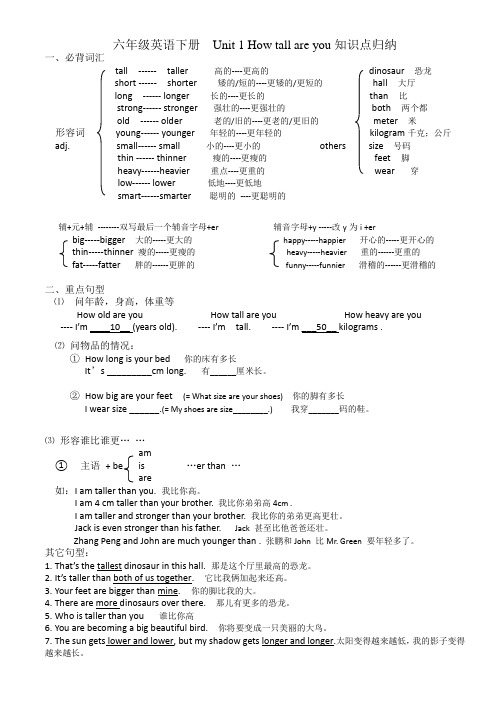
六年级英语下册Unit 1 How tall are you知识点归纳一、必背词汇tall ------ taller 高的----更高的dinosaur 恐龙short ------ shorter 矮的/短的----更矮的/更短的hall 大厅long ------ longer 长的----更长的than 比strong------ stronger 强壮的----更强壮的both 两个都old ------ older 老的/旧的----更老的/更旧的meter 米形容词young------ younger 年轻的----更年轻的kilogram千克;公斤adj. small------ small 小的----更小的others size 号码thin ------ thinner 瘦的----更瘦的feet 脚heavy------heavier 重点----更重的wear 穿low------lower低地----更低地smart------smarter聪明的----更聪明的辅+元+辅--------双写最后一个辅音字母+er 辅音字母+y -----改y为i +erbig-----bigger 大的-----更大的happy-----happier 开心的-----更开心的thin-----thinner瘦的-----更瘦的heavy-----heavier 重的------更重的fat-----fatter 胖的------更胖的funny-----funnier 滑稽的------更滑稽的二、重点句型⑴问年龄,身高,体重等How old are you How tall are you How heavy are you ---- I’m ____10__ (years old). ---- I’m tall. ---- I’m ___50__ kilograms .⑵问物品的情况:①How long is your bed你的床有多长It’s _________cm long. 有______厘米长。
六年级英语下Unit1知识点梳理

第一单元知识点梳理短语:1.多高how tall2.我们两个加起来both of us together3.在那边over there4.那么大那么高so big and tall5.多大how old6.看一看have a look7.多大码what size 8.橱窗里的那些鞋子those shoes in the window 9.在中国in China 10. 40码的鞋size 40 shoes 11.多重how heavy 12.变得越来越低get lower and lower 13. 落下go down 14. 长得更老grow older 15.长得更高grow taller单词young—younger更年轻的old -older更年长的tall- taller更高的short-shorter更矮的long-longer更长的thin-thinner更瘦的heavy-heavier更重的big-bigger更大的small -smaller更小的strong -stronger更强壮的句子1. That's the tallest dinosaur in this hall. 那是这个厅里最高的恐龙。
2. You're older than me.你比我大。
3. How tall are you?你有多高?I'm 1.65 meters.我身高1.65米。
4. What size are your shoes?你穿多大号的鞋。
My shoes are size37.我穿37号的鞋。
5. Your feet are bigger than mine.你的脚比我的大。
6. How heavy are you?你有多重?I'm 48 kilograms.我体重48公斤。
7. It’s taller than both of us together. 它比我俩加起来还高。
部编本六年级下册英语第一单元知识点归纳
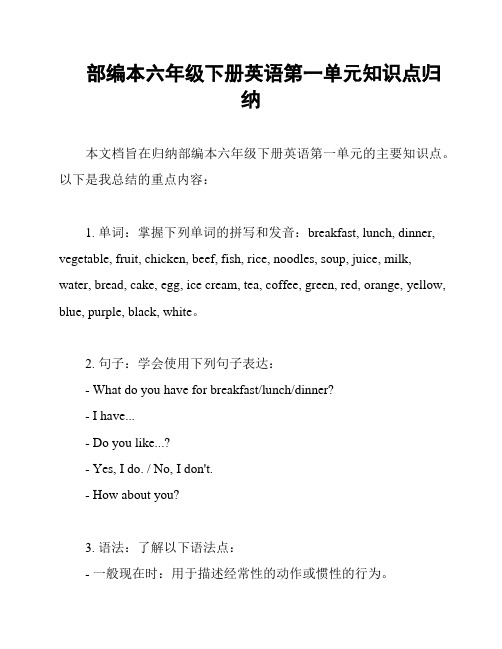
部编本六年级下册英语第一单元知识点归纳本文档旨在归纳部编本六年级下册英语第一单元的主要知识点。
以下是我总结的重点内容:1. 单词:掌握下列单词的拼写和发音:breakfast, lunch, dinner, vegetable, fruit, chicken, beef, fish, rice, noodles, soup, juice, milk, water, bread, cake, egg, ice cream, tea, coffee, green, red, orange, yellow, blue, purple, black, white。
2. 句子:学会使用下列句子表达:- What do you have for breakfast/lunch/dinner?- I have...- Do you like...?- Yes, I do. / No, I don't.- How about you?3. 语法:了解以下语法点:- 一般现在时:用于描述经常性的动作或惯性的行为。
- 第三人称单数:动词在第三人称单数时的变化规则。
4. 对话练:通过对话练,提高听力和口语能力。
可以找同学或老师一起练以下对话:- A: What do you have for breakfast?B: I have milk and bread.- A: Do you like vegetables?B: No, I don't.- A: How about you?B: I like fruits.希望以上内容能帮助你更好地掌握部编本六年级下册英语第一单元的重点知识。
如需更详细的内容,请查阅教材或咨询老师。
人教版英语六年级下册第一单元知识点总结
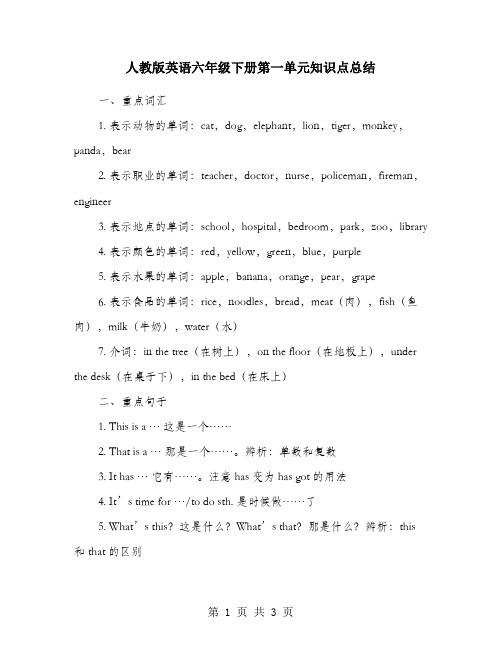
人教版英语六年级下册第一单元知识点总结一、重点词汇1. 表示动物的单词:cat,dog,elephant,lion,tiger,monkey,panda,bear2. 表示职业的单词:teacher,doctor,nurse,policeman,fireman,engineer3. 表示地点的单词:school,hospital,bedroom,park,zoo,library4. 表示颜色的单词:red,yellow,green,blue,purple5. 表示水果的单词:apple,banana,orange,pear,grape6. 表示食品的单词:rice,noodles,bread,meat(肉),fish(鱼肉),milk(牛奶),water(水)7. 介词:in the tree(在树上),on the floor(在地板上),under the desk(在桌子下),in the bed(在床上)二、重点句子1. This is a … 这是一个……2. That is a … 那是一个……。
辨析:单数和复数3. It has … 它有……。
注意has变为has got的用法4. It’s time for …/to do sth. 是时候做……了5. What’s this?这是什么?What’s that?那是什么?辨析:this 和that的区别6. Can you hear a …?你能听到……吗?用复数 hear 用法需要注意一下。
7. I like… 我喜欢……。
喜欢某事+Ving形式。
可以带to do sth或者doing sth。
记住以下词组:“喜欢的食物、水果、动物”等。
8. There be…有…… 句型表示某地有某物。
注意be动词的变化以及介词的使用。
9. I’m going to…我将要……。
记住 be going to的用法以及词组搭配。
10. Come and see me/my…来看我吧/我的……。
六年级下册英语一二单元知识总结
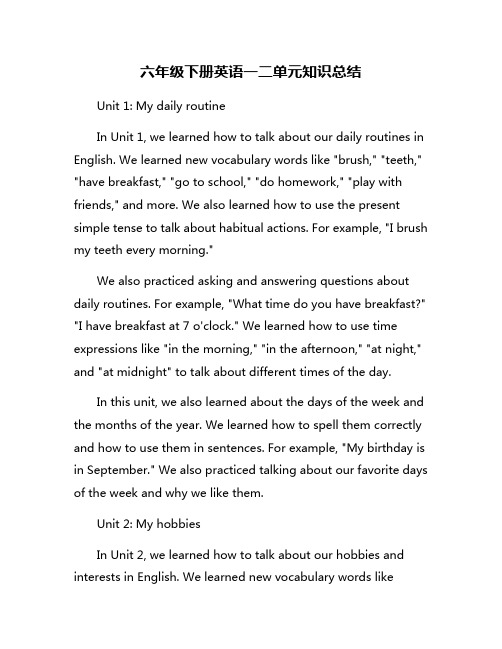
六年级下册英语一二单元知识总结Unit 1: My daily routineIn Unit 1, we learned how to talk about our daily routines in English. We learned new vocabulary words like "brush," "teeth," "have breakfast," "go to school," "do homework," "play with friends," and more. We also learned how to use the present simple tense to talk about habitual actions. For example, "I brush my teeth every morning."We also practiced asking and answering questions about daily routines. For example, "What time do you have breakfast?" "I have breakfast at 7 o'clock." We learned how to use time expressions like "in the morning," "in the afternoon," "at night," and "at midnight" to talk about different times of the day.In this unit, we also learned about the days of the week and the months of the year. We learned how to spell them correctly and how to use them in sentences. For example, "My birthday is in September." We also practiced talking about our favorite days of the week and why we like them.Unit 2: My hobbiesIn Unit 2, we learned how to talk about our hobbies and interests in English. We learned new vocabulary words like"paint," "draw," "dance," "swim," "play the piano," "play soccer," and more. We also learned how to use the present simple tense to talk about things we like to do in our free time. For example, "I like to swim on weekends."We also practiced asking and answering questions about hobbies. For example, "What do you like to do on weekends?" "I like to play soccer with my friends." We learned how to use expressions like "in my free time," "on weekends," and "after school" to talk about when we like to do our hobbies.In this unit, we also learned about different types of hobbies and activities. We learned how to describe them using adjectives like "fun," "exciting," "relaxing," and "interesting." We also practiced comparing different hobbies and activities to say which ones we like the most.Overall, Units 1 and 2 have helped us improve our English speaking and listening skills by teaching us how to talk about our daily routines and hobbies in English. We have learned new vocabulary words, grammar rules, and expressions that we can use in our conversations with others. We have also practiced asking and answering questions, describing things, and comparing different options. These skills will help uscommunicate more effectively in English and expand our language abilities.。
六年级下册英语第一单元总结
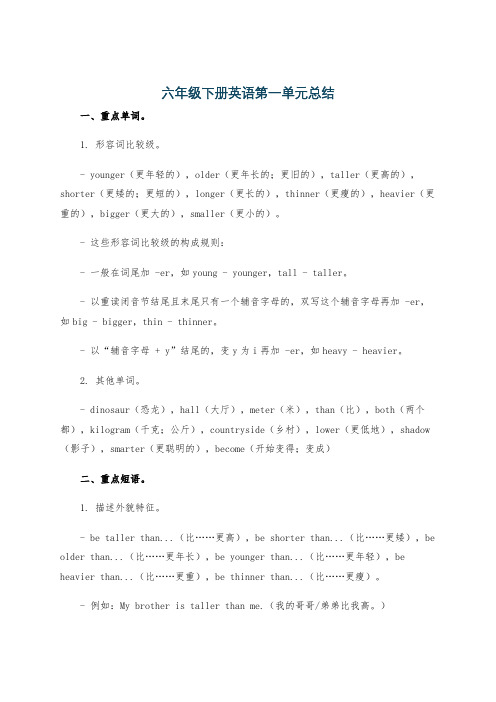
六年级下册英语第一单元总结一、重点单词。
1. 形容词比较级。
- younger(更年轻的),older(更年长的;更旧的),taller(更高的),shorter(更矮的;更短的),longer(更长的),thinner(更瘦的),heavier(更重的),bigger(更大的),smaller(更小的)。
- 这些形容词比较级的构成规则:- 一般在词尾加 -er,如young - younger,tall - taller。
- 以重读闭音节结尾且末尾只有一个辅音字母的,双写这个辅音字母再加 -er,如big - bigger,thin - thinner。
- 以“辅音字母 + y”结尾的,变y为i再加 -er,如heavy - heavier。
2. 其他单词。
- dinosaur(恐龙),hall(大厅),meter(米),than(比),both(两个都),kilogram(千克;公斤),countryside(乡村),lower(更低地),shadow (影子),smarter(更聪明的),become(开始变得;变成)二、重点短语。
1. 描述外貌特征。
- be taller than...(比……更高),be shorter than...(比……更矮),be older than...(比……更年长),be younger than...(比……更年轻),be heavier than...(比……更重),be thinner than...(比……更瘦)。
- 例如:My brother is taller than me.(我的哥哥/弟弟比我高。
)2. 地点短语。
- in the countryside(在乡村),in the hall(在大厅里)三、重点句型。
1. 比较级句型。
- A+be动词+比较级+than + B.(A比B更……)- 例如:The giraffe is taller than the deer.(长颈鹿比鹿更高。
小学英语六年级下册第一单元知识点总结
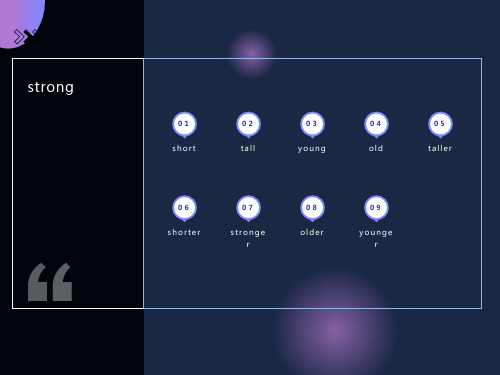
How are you?
How old are you?
I’m 9 years old.
I’m 164 cm tall.
How tall are you? 句式:主语+be动词+数字+长度单位+tall
百位数的读法
238
three hundred and ten
多重
询问重量
How heavy are you?
how old
多大
询问年龄
How old are you?
how long
多长
询问身体部位的长度
How long is your leg?
how big
多大
询问身体部位的大小
How big are your hands?
巧用how问体貌
动词line意为“沿….形成行(或列、排)”, line up是固定短语,意味“排队”
Line up from shorter to taller!
from… to…意为“从…到…”,起连接作用
How tall am I ? 我多高? 句式: How tall + be动词+主语?
形容词
原级
比较级
最高级
tall
tall 高的
taller 更高的
tallest 最高的
short
short 矮的
shorter 更矮的
shortest 最矮的
strong
strong 强壮的
stronger weaker
strongest 最强壮的
old
old 年龄大的
older 年龄更大的
六年级下册英语第一单元重点归纳

精心整理六年级下册英语第一单元重点归纳
比较级:
Younger更年轻的older 更年长的heavier 更重的
How heavy 多重how tall 多高what size 什么尺码
Go down 落下have a try 试一试catch the ball 接到球
惯用表达:
Let’s have a look 让我们看一看really?真的吗?
I can’t wait 我等不及了what’s happening here? 这里正在发生什么?
What 短语知多少
作文延伸:
介绍家庭成员
题目:my family
1.先介绍家里几口人(There are+数字+in my family)
2.分别是谁(They are+人物角色)
3.成员之间先比较年龄(写两点)身高(写一点)体重(写一点)
4.结尾表达爱家人,是幸福一家(I love….
例文:
There are 4 people in my family. They are my father,my mother,my sister and me.。
六年级英语下册第一单元知识学习总结要点整理(译林版)

六年级英语下册第一单元知识点整理(译林版)Unit1whoisyounger?一、单词:than比chat聊天young年轻的old年老的strong强壮的fat胖的thin瘦的heavy重的light轻的short短的、矮的long长的tall高的small小的big大的sit坐meet 遇见、见面twin之一as作为minute分钟only惟一的、仅有的child孩子little小的cute伶俐的、可爱的also也centimetre厘米height身高weight体重worm蠕虫二、词组:.onSundaymorning在星期天早晨2.goforawalk去散步3.lookthesame看起来一样4.oneday某一天5.astallas与…..一样高asfatas与…..一样胖aslongas与….一样长6.shorterthan…比….矮biggerthan比…大heavierthan比…重7.twentyminutesyounger小二十分钟8.oneyearolder 大一岁9.sitdownunderabigtree坐在大树下10.begladtodo非常高兴做某事1.seethem/him/you看见他们/他/你12.lookdifferent 看起来不同3.atwinsister双胞胎姐妹14.myclassmate/deskmate 我的同班同学/同桌5.howold多大16.theonlychild仅有的一个孩子7.acutelittledog一只可爱的小狗18.getabrother得了个弟弟9.atallboy一个高个子的男孩20.ayoungteacher一位年轻的教师21.someheavyboxes一些重的盒子22.whoseclassroom 谁的教室23.youroldfriend你的老朋友24.aheavyschoolbag一只重的书包25.astronggoalkeeper一个强壮的守门员26.brothersandsisters兄弟姐妹27.thegirlinred穿红衣服的女孩28.yoursormine你的还是我的29.lookyoung看起来年轻30.haveachat聊天、闲谈31.asksomequeations问一些问题三、形容词比较级:A.直接加er/rtall---________light----________young--_________old---________strong--___B.双写加erbig-------_________fat-----_________thin---______ __c.去y改i加erheavy---_________四、句型:、who’syoungerthanhim?谁比他年轻?mybrotherisyoungerthanhim.我弟弟比他年轻。
- 1、下载文档前请自行甄别文档内容的完整性,平台不提供额外的编辑、内容补充、找答案等附加服务。
- 2、"仅部分预览"的文档,不可在线预览部分如存在完整性等问题,可反馈申请退款(可完整预览的文档不适用该条件!)。
- 3、如文档侵犯您的权益,请联系客服反馈,我们会尽快为您处理(人工客服工作时间:9:00-18:30)。
• 白体单词:dinosaur hall metre
meter than both kilogram countryside lower shadow smarter become
Unit 1 How tall are you
• • • • • • • • • That's the tallest dinosaur in this hall. It's than both of us together. How tall are you. I'm 1.65 metres. What size are your shoes,Mike? Your feet are bigger than mine. My shoes are size 37. How heavy are you? I'm 48 kilograms.
Unit 1 How tall are you
• 本单元重点句型: • 两个人或事物进行比较句型: A+be动词+形容词比较级+than+B. • 询问服装大小的句型及答语: 提问:What size+is/are+衣服(鞋帽等)? 回答:Size+数字./衣服(鞋帽等)+is/are+size+数字. • 询问身高、体重的句型及答语: 提问:How tall/heavy+be动词+主语? 回答:主语+be动词+数字+(长度/重量)单位.
期末总复习
六年级下册
Unit 1 How tall are you?
Unit 2 Last weekend .
Unit 3 Where did you go?
Unit 4 Then and now
Unit 1 How tall are you • 单词: • 四汇单词:younger older shorter
• • • •
•
• ห้องสมุดไป่ตู้ •
•
形容词比较级的变化: ⒈单音节形容词和部分双音节词,一般在词尾加-er. 2.以字母e结尾的词,在词尾加-r. 3.重读闭音节词词尾只有一个辅音字母时,先双写该辅音 字母,再加er. 4.以"辅音字母+y“结尾的双音节词,先把”y“改 为”i“,再加-er. 5.多音节词和部分双音节词,在词前加”more“. 6.部分形容词和副词的比较级是不规则的,如: good/well-better,bad/badly-worse. 7.由“动词+后缀-ing/-ed”构成的形容词,在词前加 more构成比较级.如:interesting-more interesting,bored-more bored. 8.由“形容词+后缀-ly”构成的副词,在该副词前加more 构成比较级.如:slowly-more slowly,happily- more happily.
• 教你回答高度: 提问:How tall+be 动词+人/物? 回答:人/物+be动词+数字+长度单位+tall. 注意:how tall意为“多高”,常用来询问高度。be动词根据主语 的变化而变化。 • 形容词比较级句型的基本结构: A+be动词+形容词比较级+than+B. • 选择疑问句: • 特殊选择疑问句句型: 特殊疑问句+A(可选择部分)+or+B(可选择部分)? 例句:Whose car is this,your or hers?这是谁的车,你的还是她的 • 一般特殊选择疑问句: 一般疑问句+or+可选择部分? 例句:Are you hungry or thirsty?你饿了还是渴了?
